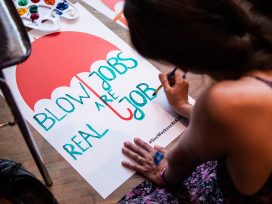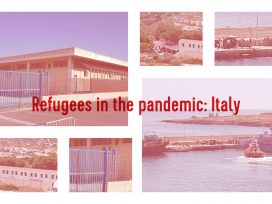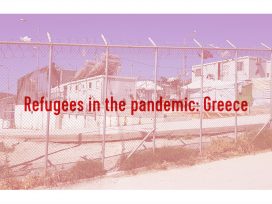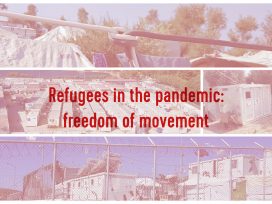Asocial distancing
The mistreatment of Roma and homeless people in the corona crisis
Corralling homeless people into gymnasiums and building walls around Roma settlements: the COVID-19 measures show their ugliest face when it comes to the overpolicing of marginalized groups. A European survey.
Since March, as the coronavirus pandemic spread through Europe, governments have imposed severe restrictions on hundreds of millions of people. For the most part, these are in the interests of public health. But reports are already starting to accumulate of measures that go well beyond what is required, forcing large groups of people to live in circumstances that actively threaten their safety and wellbeing.
Confinement instead of containment
In late March, French police in Paris started corralling homeless people into city gymnasiums to keep them off the streets. On 6 April, the Italian military surrounded a squat in Rome, home to around 500 migrants from Africa, with fences and armed patrols. In early April, Serbia and Bosnia banned around 15,000 migrants from leaving their reception centres. On 11 April, Greece placed an entire Roma settlement in the central Greek city of Larissa under lockdown. On 15 April, migrants’ rights charities in the UK warned that asylum-seekers were being forced to choose between overcrowded state accommodation and homelessness, because evictions had been suspended but no extra provisions laid on for new arrivals. And on 17 April, Amnesty International published an alert about special containment policies applied exclusively to Roma settlements in Bulgaria and Slovakia that included ‘temporary walls’, police roadblocks and drone surveillance.
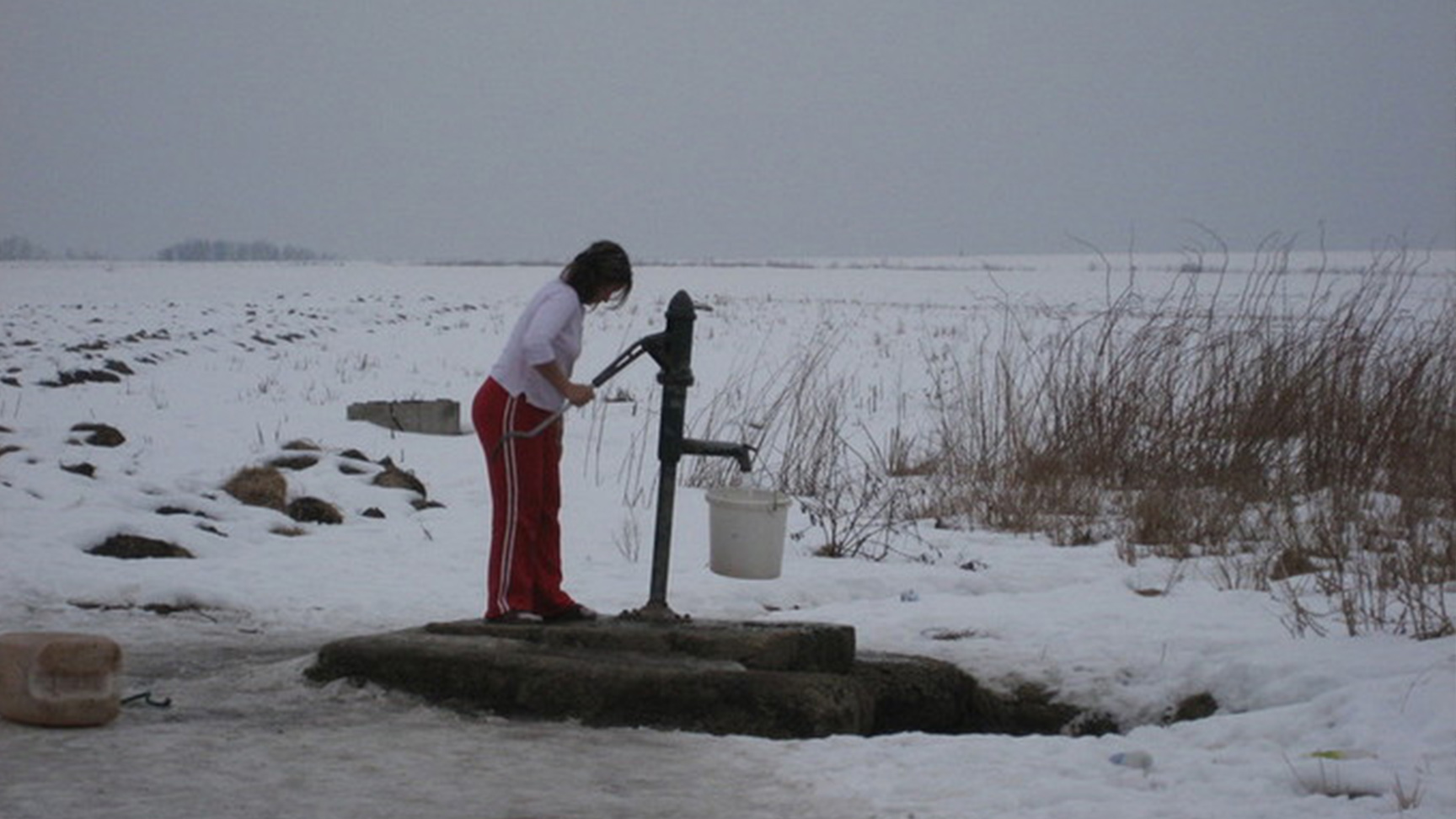
Photo via Amnesty International.
These measures vary in severity and duration but what they have in common is that they are all being applied to groups who were already being sidelined before the pandemic, either through systemic inequality, deliberately hostile state policies or racist discrimination. They also tend to be harsher, cruder and more readily backed up with force than lockdowns applied to the rest of the population: indeed, the London-based Institute of Race Relations suggests that the worst of these should not be described as lockdowns at all, but as ‘targeted quarantine and militarized confinement’, based on ‘cultural stereotyping and collective stigmatisation’. As governments take on emergency powers to deal with the crisis, we are starting to see a disturbing trend emerge.
Unequal threat
Although the pandemic has been hailed in some quarters as a ‘great leveller’, it is already apparent that we are not experiencing its effects equally. Anyone can catch the virus, but inequality and discrimination shape how it plays out: whether we can access healthcare; what state our working lives have left our bodies in; whether we can afford to take time off work to recuperate; whether we have caring responsibilities for others, or the financial cushion to ride out an economic depression.
Physical space has become an increasingly important asset, as the majority of us shelter in our homes. What space we can access, and on whose terms, is coming to define how we experience the pandemic, and the lockdown has already made visible an array of crowded and precarious living conditions.
In a large European city like London, studies have found that people living in deprived areas and those from black, Asian and minority ethnic backgrounds are more reliant on the city’s parks and public green spaces – constantly under the threat of closure – for their daily exercise and emotional well-being. More generally, people living in crowded accommodation, who share kitchens and bathrooms, are at greater risk of catching the coronavirus, and of being evicted if they can’t keep paying the rent or if their landlord is scared of infection. This has the greatest impact on the people who Europe’s economies already treated as disposable.
Alexander, a Romanian working in London who was sacked from his job at a pizza chain a few weeks ago, told the Guardian newspaper that he was already experienced at sleeping rough, ‘since he was already unable to afford to rent a room on his minimum wage earnings even when he was in work.’
The pre-existing housing crisis
Europe already had a housing crisis. Before the coronavirus arrived, there were an estimated 700,000 people sleeping rough or in hostels in the EU and UK on any given night, a rise of 70% compared with a decade ago. Suddenly, governments have made huge and unprecedented moves to take people off the streets and house them.
In early April, the European Parliament took the symbolic step of offering one of its now-empty buildings to the homeless of Brussels, and distributing food from the parliament’s kitchens to the hungry. Cities around Europe have requisitioned hotels and Airbnb properties for homeless people, often at considerable cost.
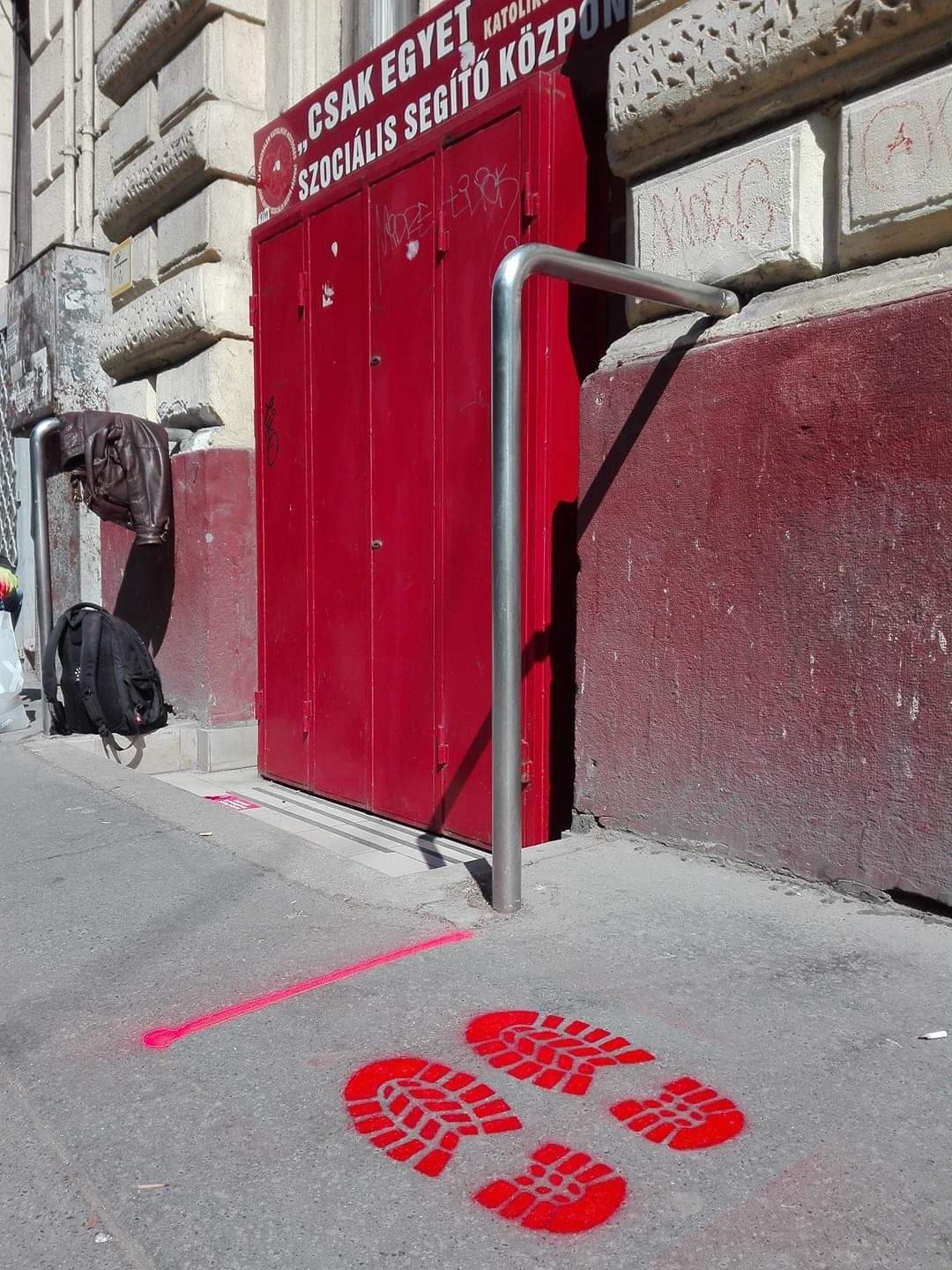
Social distancing guide in front of a Catholic social support centre in downtown Budapest. Street art project and photo courtesy of the Hungarian Two Tailed Dog Party.
The public health reasons are clear: to reduce transmission of the coronavirus it’s vital that people have safe, healthy living conditions and the space to self-isolate if they get sick. There’s a collective interest in ensuring this.
But social distancing can also compound people’s problems. In many cities, day centres for the homeless, food banks and soup kitchens have been closing because volunteers can no longer staff them, or because there has been a fall in donations. Hostels may reduce visible homelessness but they are not necessarily safe for the people who live in them: on 19 April, the Observer newspaper found that at least 6 people linked to hostels in London had died from the coronavirus.
In such circumstances, states can end up penalising people for their own poverty. The crude response of Paris police in the early stages of the pandemic is one example: it serves the interests of the majority while making life actively worse for the minority.
In late March, the Italian Federation of Organisations for Homeless People wrote to their country’s interior ministry asking for the police to stop issuing fines to rough sleepers for breaking lockdown conditions when they had nowhere else to go. Greek police have been issuing similar fines.
Solidarity with limits
The situation becomes doubly difficult when people living on the streets and in other precarious conditions are there by design. The UK, for instance, has refused to lift its complex web of bureaucratic restrictions that exclude many immigrants from the welfare state: by April this had contributed to a rise in the number of people sleeping rough at Heathrow Airport.
In many parts of Europe, migrants and refugees were already being forced to live in crowded hostels, camps and squats by dysfunctional and punitive asylum policies. In a number of cases – the squat in Rome, the camps in Bosnia and Serbia, along with a number of refugee camps in Greece – the instinctive response of authorities to reports of coronavirus infection has been to shut off contact with the outside world, rather than to intervene, improve conditions and isolate the infected.
This reflects a wider political context: if people are already stigmatised as ‘illegal’ and as carriers of crime and disease – as migrants and refugees frequently are, for example – then it will likely shape their treatment during a health emergency. The risk is that states will treat certain groups as if they are by their nature dirty, physically cordoning them off from the rest of society; a form of treatment that has lasting and divisive effects.
Overpolicing Roma communities
On 13 March, Bulgaria’s parliament declared a state of emergency, with restrictions on the movement of all citizens. In the following weeks, however, mayors across the country began to cordon off Roma villages and informal settlements, setting up police checkpoints to stop people from entering and leaving. Several municipal authorities have also used drones to remotely check the temperature of people in Roma communities – a measure not extended to non-Roma residents.
In April, Slovakia sent in the army to test residents of several dozen Roma settlements for coronavirus, where residents had recently returned from the Czech Republic and the UK; on 9 April the Slovakian government quarantined five entire settlements, home to around 6,800 people, after recording 31 cases of the coronavirus.
Amnesty International, which published its alert on 17 April, suggests that the quarantine measures may be in violation of human rights if they are a disproportionate response to public health needs. The organisation points out that Roma communities in Slovakia and Bulgaria frequently live in overcrowded conditions, lack access to electricity and running water, and suggests that the containment policies are being shaped by anti-Roma prejudice.
Amnesty reports that in Bulgaria, where officials have claimed that a ‘lack of discipline’ among Roma residents makes these drastic measures necessary, the government has so far provided no assistance to help people in the settlements comply with handwashing guidelines or access medical care. Slovakia, meanwhile, has said it will remove infected residents from Roma settlements and place them into state quarantine, but to date, according to Amnesty, the number of people transferred ‘remains very low.’
Spiralling antigypsysm
Writing for the Health and Human Rights Journal in early April, the public health and Roma rights specialists Margareta Matache and Jacqueline Bhabha warned that racism against Roma was ‘spiralling’ in Europe as a result of the pandemic.
They noted several incidents outside Slovakia and Bulgaria, including a ban on Roma entering the city of Ponorâta, Romania, and an incident in North Macedonia where nine Romani musicians were singled out from a larger group of 200 and forced into quarantine.
The pattern has continued. When Greece locked down the Roma settlement in Larissa, it provoked a storm of antigypsyism on social media. A spokesman for the health ministry was forced to intervene, warning that Roma ‘are not a threat, they are a vulnerable social group.’
In Spain, El Diario reported on 16 April that a family of Roma origin in Bizkaia had been suffering continuous racist abuse since lockdown measures were introduced across the country.
Matache and Bhabha note that the current wave has echoes in a much longer history of prejudice. ‘In the centuries of Roma enslavement’ – slavery persisted in what is now Romania until the 19th century – ‘enslaved nomadic Romani people were forbidden from entering the city of Bucharest during outbreaks of plague,’ they write.
Today, as Europe adjusts to the prospect of a prolonged lockdown – and an even longer period of economic upheaval – this discrimination has the potential to become entrenched in several ways.
The lockdown may itself deepen existing inequalities: for instance the Roma Education Fund, a Budapest-based NGO, warns that a Hungarian policy which makes social security payments for families dependent on school attendance risks penalizing many Roma children because they do not have the laptops, tablets or internet connections that would allow them to follow classes remotely.
The European Public Health Alliance has cautioned that lockdown conditions will make it even harder for Roma communities and other vulnerable groups to access healthcare.
The more that states enforce physical segregation, the more it will validate existing prejudices. The Central Council of German Sinti and Roma, one of several organisations monitoring responses to the pandemic across Europe, warns of a looming humanitarian crisis for Roma communities in the Western Balkans and Turkey, along with the prospect of racist violence from police and vigilante groups.
Traditional scapegoats
Existing prejudice has intensified as people seek out scapegoats: racist abuse directed at people of Chinese or east Asian heritage, along with islamophobia and antisemitic conspiracy theories, has proliferated in recent weeks. However, for many Roma communities the problem is compounded because prejudice and discrimination are so firmly etched into their physical living conditions.
In his 2017 book Romaphobia, the political scientist Aidan McGarry describes a vicious circle: pushed to the margins by societies that refuse to fully accept them as citizens – denied access, for instance, to decent housing or sanitation – their visible poverty then becomes justification for further discrimination.
States, he writes, have ‘managed to pull off a great trick: relegating Roma to zones of exclusion in decomposing neighbourhoods and stigmatising them for choosing to live there.’
Maintaining social control
The pandemic has given new urgency to the question of collective welfare. Even governments that are usually committed to letting market forces dominate society are, at least for the moment, using the state to make large-scale interventions in the economy and everyday life. The political rhetoric that dominates is of common struggle, of the strong protecting the weak and of sacrifice for the good of the community.
Yet communities define themselves partly by who they exclude: the foreign, the undeserving, the unpatriotic. We do not experience this new threat to survival as if it were a fresh page in history, but instead carry with us the conflicts and injustices that have accumulated over time.
A crisis can expose the vulnerabilities of a society that were previously obscured or conveniently ignored. If we cannot fix these problems then the pressure to blame people for their own misfortune creeps back.
In a new book on the political meaning of stigma – the processes by which people are marked out and ostracised – the sociologist Imogen Tyler argues that it goes beyond individual prejudice and ignorance. Instead, she suggests, we should see it as ‘a form of power, entangled with histories of capitalism, colonialism and patriarchy’, that can be used by governing elites to maintain social control.
One example she gives is of the way the British government, supported by sympathetic media outlets, attacked supposedly unworthy recipients of social security – people receiving disability or unemployment benefits – in the years after the financial crisis, to build popular support for its austerity policies that transferred wealth out of the public sector and into private hands. Another is of the way racist fears about migrants from outside Europe have, since the refugee crisis, been mobilized to justify caging people and denying them aid.
New forms of repression
A pressing danger of this new crisis is that it will deepen existing discrimination. But it may also lead to new forms. As they race to control the virus, governments are developing new ways to monitor, regulate and divide up populations at a startling pace. In the short term, these may well be necessary to keep people safe – but it involves the suspension of many important rights, and the longer that states of emergency continue, the stronger the temptation will be to use them to suppress dissent or maintain inequality.
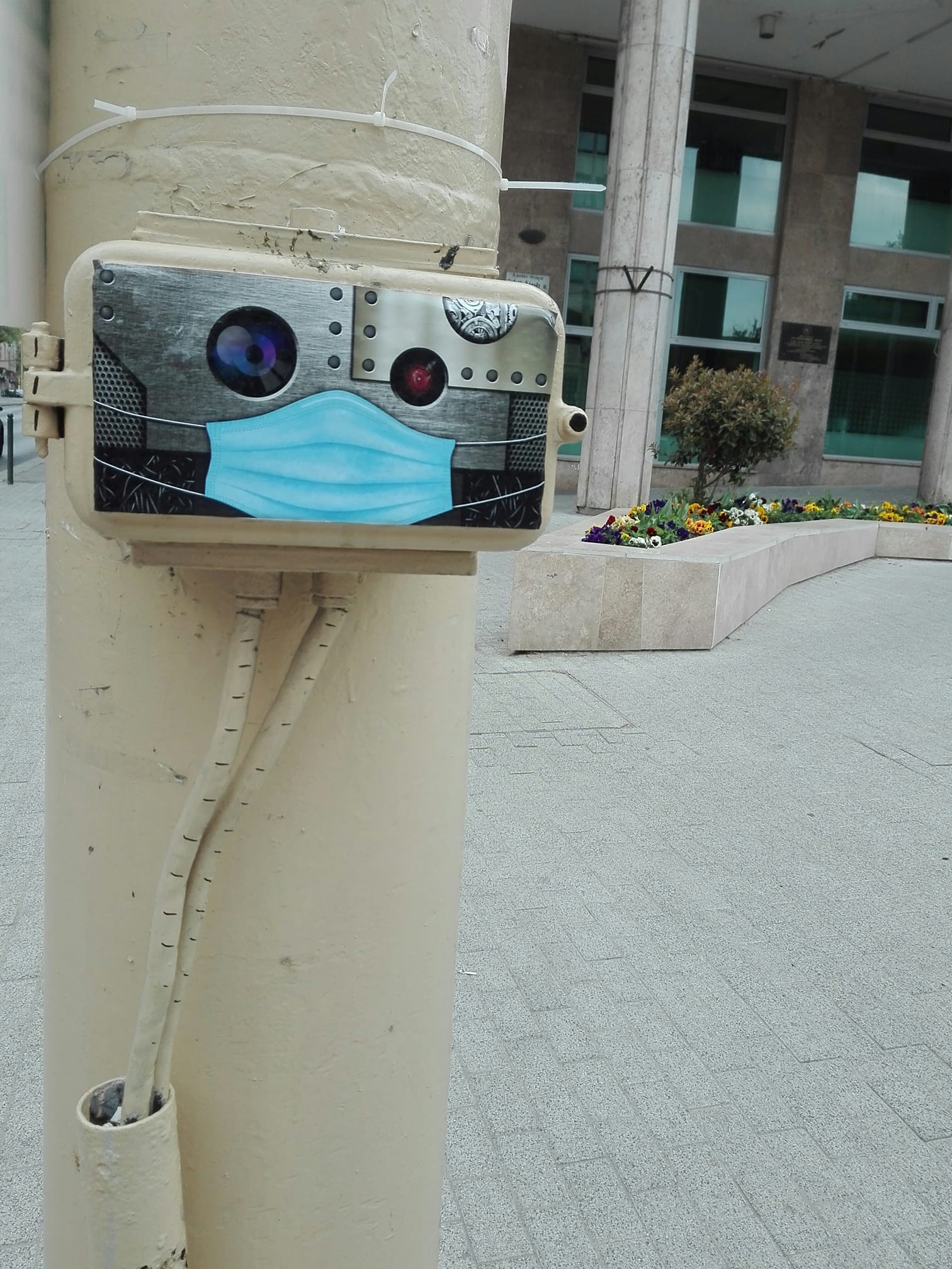
Robots are being careful. Street art project on a lamp post and photo courtesy of the Hungarian Two Tailed Dog Party.
It may well turn out that techniques of surveillance and control once reserved for people on the margins are extended to others: in late April the Bureau of Investigative Journalism reported that tech companies that had been scouring social media, using big data to predict the movement of refugees into Europe, were now pitching their products as a way to track the spread of the pandemic.
One way to ensure that our rights are not permanently curtailed is to speak out against the treatment of people who are already being pushed to the margins. To insist that everybody is assured of the same basic conditions – of healthcare, economic security, and a dignified life – is not only about protection in the short term, but also needs a vision of the kind of future society we want to build.
A good place to start would be by insisting that our governments stop building walls and give people the space they need.
Published 5 May 2020
Original in English
First published by Eurozine
© Daniel Trilling / Eurozine
PDF/PRINTIn focal points
Newsletter
Subscribe to know what’s worth thinking about.
Related Articles
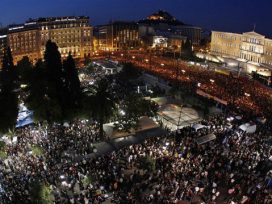
Beginning in Athens’ Syntagma Square in summer 2011, a new wave of anti-austerity protest swept across Europe. Commoning practices became crucial to sustaining these movements’ momentum. Lazaros Karaliotas considers the implications for reorganizing urban life today.

Higher education and its discontents
A conversation with Jon Nixon
The audit culture resulting from neoliberal policies has had a deleterious effect on all sectors of society, and no less so on the universities, says higher education expert Jon Nixon. Clearly, the logic of austerity constitutes an existential threat to the great humanistic traditions of scholarship.
